本试题 “短文改错。文中共有10处语言错误,要求你在错误的地方增加、删除或修改某个单词。增加:在缺词处加一个漏字符号(∧),并在其下面写上该加的词。删除:把多余...” 主要考查您对可数名词及其单复数
定冠词
人称代词
连接代词
形容词
关系副词
介词和介词短语
动词短语
一般现在时的被动语态
主谓一致
等考点的理解。关于这些考点您可以点击下面的选项卡查看详细档案。
- 可数名词及其单复数
- 定冠词
- 人称代词
- 连接代词
- 形容词
- 关系副词
- 介词和介词短语
- 动词短语
- 一般现在时的被动语态
- 主谓一致
可数名词:
是指能以数目来计算,可以分成个体的人或东西;因此它有复数形式,当它的复数形式在句子中作主语时,句子的谓语也应用复数形式。
可数名词复数的规则变化:
| 情况 | 构成方法 | 读音 | 例词 |
| 一般情况 | 加 –s | 1.清辅音后读/s/; 2.浊辅音和元音后读/z/; |
map-maps bag-bags car-cars |
| 以s,sh,ch,x等结尾的词 | 加 -es | 读 /iz/ | bus-buses watch-watches |
| 以ce,se,ze,(d)ge等结尾 的词 |
加 -s | 读 /iz/ | license-licenses |
| 以辅音字母+y结尾的词 | 变y 为i再加es | 读 /z/ | baby-babies |
1)以y 结尾的专有名词,或元音字母+y结尾的名词变复数时,直接加s变复数:
如:two Marys the Henrys monkey---monkeys holiday---holidays
比较:层楼:storey---storeys story---stories
2)以o 结尾的名词,变复数时:
a. 加s,如: photo---photos piano---pianos
b. 加es,如:potato--potatoes tomato--tomatoes
c. 均可,如:zero---zeros / zeroes
3)以f或fe 结尾的名词变复数时:
a. 加s,如: belief---beliefs roof---roofs safe---safes gulf---gulfs;
b. 去f, fe 加ves,如:half---halves knife---knives leaf---leaves wolf---wolves wife---wives life---lives thief---thieves;
c. 均可,如:handkerchief: handkerchiefs / handkerchieves
可数名词复数的不规则变化:
1)child---children foot---feet tooth---teeth mouse---mice man---men woman---women
注意:与 man 和 woman构成的合成词,其复数形式也是 -men 和-women。
如:an Englishman,two Englishmen. 但German不是合成词,故复数形式为Germans;Bowman是姓,其复数是the Bowmans。
2)单复同形 如:
deer,sheep,fish,Chinese,Japanese
li,jin,yuan,two li,three mu,four jin
但除人民币元、角、分外,美元、英镑、法郎等都有复数形式。如:
a dollar, two dollars; a meter, two meters
3)集体名词,以单数形式出现,但实为复数。
如:staff people police cattle 等本身就是复数,不能说a staff a people,a police,a cattle,
但可以说a person,a policeman,a head of cattle, the English,the British,the French,the Chinese,the
Japanese, the Swiss 等名词,表示国民总称时,作复数用。
如:The Chinese are industries and brave. 中国人民是勤劳勇敢的。
4)以s 结尾,仍为单数的名词,如:
a. maths,politics,physics等学科名词,为不可数名词,是单数。
b. news 是不可数名词。
c. the United States,the United Nations 应视为单数。
The United Nations was organized in 1945. 联合国是1945年组建起来的。
d. 以复数形式出现的书名,剧名,报纸,杂志名,也可视为单数。
"The Arabian Nights" is a very interesting story-book.
<<一千零一夜>>是一本非常有趣的故事书。
5) 表示由两部分构成的东西,如:glasses (眼镜) trousers, clothes ;
若表达具体数目,要借助数量词 pair(对,双); suit(套); a pair of glasses; two pairs of trousers
6)另外还有一些名词,其复数形式有时可表示特别意思,如:goods货物,waters水域,fishes(各种)鱼
复合名词的复数形式:
名词作定语名词作定语一般用单数,但也有以下例外。
1)用复数作定语。
如:sports meeting 运动会
students reading-room 学生阅览室
talks table 谈判桌
the foreign languages department 外语系
2)man, woman, gentleman等作定语时,其单复数以所修饰的名词的单复数而定。
如:men workers
women teachers
gentlemen officials
3)有些原有s结尾的名词,作定语时,s保留。
如:goods train (货车)
arms produce 武器生产
customs papers 海关文件
clothes brush衣刷
4)数词+名词作定语时,这个名词一般保留单数形式。
如:two-dozen eggs 两打/(二十四个鸡蛋)
a ten-mile walk 十里路
two-hundred trees 两百棵树
a five-year plan 一个五年计划
可数名词单复数知识体系:

不同国籍人的单复数:
国籍
总称(谓语用复数)
单数
复数
中国人
the Chinese
a Chinese
two Chinese
瑞士人
the Swiss
a Swiss
two Swiss
澳大利亚人
the Australians
an Australian
two Australians
俄国人
the Russians
a Russian
two Russians
意大利人
the Italians
an Italian
two Italians
希腊人
the Greek
a Greek
two Greeks
法国人
the French
a Frenchman
two Frenchmen
日本人
the Japanese
a Japanese
two Japanese
美国人
the Americans
an American
two Americans
印度人
the Indians
an Indian
two Indians
加拿大人
the Canadians
a Canadian
two Canadians
德国人
the Germans
a German
two Germans
英国人
the English
an Englishman
two Englishmen
瑞典人
the Swedish
a Swede
two Swedes
定冠词的定义:
定冠词the 有this,that,these,those等意义,但较弱,用于单数或复数名词前,主要用来特指,使一个或几个事物区别于所有其他同名的事物。
定冠词通常位于名词或名词修饰语前,但放在both、all、double、half、twice等词之后。
如:All the students in the class went out.班里所有的学生都出去了。
定冠词的用法:
1、表示特指:
如:Look! A car has stopped there. The car is beautiful. 瞧,有辆汽车在那儿停下了。那辆汽车可真漂亮。
Why not ask the teacher? 为什么不问问老师?
2、与单数可数名词连用表类别:
如:I hate the telephone. 我讨厌电话。
The cobra is dangerous. 眼镜蛇是危险的。
3、与某些形容词连用表示类别:
如:The rich are not always happier than the poor. 富人并不总是比穷人过得开心。
Theoldaremorelikelytocatchcoldthantheyoung.老年人比年轻人容易感冒。
4、用于独一无二的事物名词前:
如:The earth goes around the sun. 地球绕着太阳转。
The sky was blue and clear. 天空清澈湛蓝。
5、用于方向或方位等名词前:
如:He looked towards the east. 他朝东望。
Turn to the right at the second crossing. 在第二十字路口向右拐。
6、用于序数词或形容词的最高级前:
如:You will be the second to speak. 你第二个发言。
Autumn is the best season here. 秋季是这里最好的季节。
7、用于乐器名词前表示演奏:
如:He plays the piano very well. 他的钢琴弹得很好。
注:若不是从演奏角度来考虑,而是考虑乐器的实体,则不一定用定冠词:
He bought a piano for his son. 他为儿子买了部钢琴。
定冠词与不定冠词互换用法比较:
1、在形容词最高级前一般加定冠词。但有时却用不定冠词,这时它不表示“最”的意思,而表示“非常”“很”的意思。
如:This is the most important question of all. 这是所有问题中最重要的一个。
This is a most important question. 这时一个非常重要的问题。
2、在序数词前加定冠词,表示“第几”;加不定冠词则表示“又”“再”。
如:Will you be the firse to read the text? 你第一个读课文好吗?
Will you have a second try? 你再试一次好吗?
3、在有些短语中,用定冠词和不定冠词一样。
如:The number of our school students is about 1500. 我校学生人数约为1500人。
定冠词的用法口诀:
特指双熟悉,上文已提及;
世上独无二,序数最高级;
某些专有名,习语及乐器。
以上口诀归纳了用定冠词的一般情况,即:
①特指某些人或物
②谈话双方都熟悉的人或事
③上文已经提到的人或事
④世界上独一无二的事物前
⑤序数词回形容词最高级前
⑥某些专有名词前
⑦一些习惯短语(如:intheday等)中和乐器前(如:playtheviolin/piano)。
定冠词知识体系:
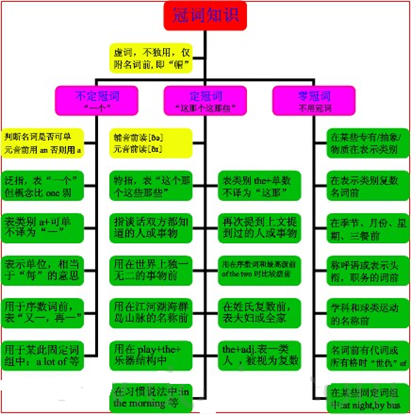
定冠词用法拓展:
1、用于姓氏的复数前,表示全家人或全家中两个或两个以上的人:
如:The Browns live next to us. 布朗一家就住在我们隔壁。
The Greens have no Children. 格林夫妇没有小孩。
2、用来代替前面已提到的人的身体部位或衣着等的一部分:
如:He hit me in the face. 他打我的脸。
He caught the thief by the collar. 他抓住小偷的衣领。
3、用于逢整十数词的复数名词前,指世纪中的年代或人的约略年岁:
如:He began to learn French in his fifties. 他五十多岁开始学习法语。
He went to Japan with his family in the sixties. 他在60年代带家人去了日本。
4、用于某些单数可数名词前,使意义抽象化,指其属性或功能等:
如:This colour is pleasant to the eye. 这颜色悦目。
He is fond of the bottle. 他喜欢喝酒。
5、表示计算单位,含有a, each, per 之类的意义:
如:He is paid by the hour (piece). 他拿计时(件)工资。
It sells at two dollars the pound. 这东西每磅卖两美元。
6、用于人名前,或特指、或比喻、或指其作品等;用于某些产品的名称前,指产品:
如:He likes the Picasso. 他喜欢毕加索的画。
Lu Xun has been known as the Gorky of China. 鲁迅人称中国的高尔基。
7、用于江、(运)河、海、洋以及山脉、群岛、半岛、海岛、海峡、沙漠等名称的前:
如:the Chang jiang River 长江
the Pacific(Ocean) 太平洋
the Suez(Canal) 苏伊士运河
①关于湖名前是否用冠词通常要分两种情况:
中国的湖名在英译时,其前通常加定冠词:
the West Lake 西湖,the Dong ting Lake洞庭湖。
而外国的湖名前,多数不加定冠词,少数加定冠词,视习惯而定:
Lake Success 成功湖,the Lake of Geneva日内瓦湖
②山名的构成有两种方式:
若用于“山名+Mountains”,其前常用定冠词:the Jing gang Mountains 井冈山;
若用于“Mount/Mt+山名”,则通常不用冠词:Mount Tai 泰山。
另外,若不出现mountain一词时,则通常要用冠词:theAlps阿尔卑斯山。
8、用于由普通名词或含有普通名词构成的专有名词 (如国名、地名、政党、团体、组织机构以及旅馆、商店、学校、医院、文娱场所、建筑物等)前:
如:the United Nations 联合国
the People's Republic of China 中华人民共和国
the National People's Congress 全国人民代表大会
注:大学名称的构成要注意以下情况:
①对于以地名命名的大学,通常有两种形式 (注意冠词的有无):
如:the University of London / London University 伦敦大学
②对于以人名命名的大学,通常只有一种表达(不用冠词):
如:Yale University 耶鲁大学
Brown University 布朗大学
人称代词的概念:
人称代词是替代我、你、他、她、它、我们、你们、他们、她们、它们等人称的词。
人称代词分为主格和宾格形式,并有人称的单复数形式。按所替代人称的不同分为第一人称、第二人称和第三人称。
人称代词的用法:
人称代词在句中可以用作主语(用主格,如:I,you,he,she,we,they,等)和宾语(用宾格,如 me,you,him,her,us,them等)
如:He loves her, but she hates him. 他爱她,但她却讨厌他。
注:(1)在口语中,当人称代词用作表语、用于than, as之后或用于强调句中被强调时,可以用语。 例如:
"Who is it?" "It's me."“是谁呀?”“是我。”
He sings better than me. 他比我唱得好。
He is as tall as her. 他和她一样高。
It's me who did it. 这是我干的。但是,若than,as后的人称代词后跟有动词,则必须用主格。例如:
He sings better than I do./ He is as tall as she is.
(2)单独使用的人称代词通常用宾格。
"I' m tired.""Me too."“我累了。”“我也累了。”
"Who wants this?" "Me."“谁要这个?”“我要。”
(3)有时用主格或宾格会导致意思的变化。
I like you better than he. 我比他更喜欢你。为 I like you better than he likes you. 之略。
I like you better than him. 我喜欢你胜过喜欢他。为 I like you better than he likes him. 之略。
人称代词主格、宾格、人称、单复数对比:
|
人称代词 |
单数 |
复数 | ||
|
主格 |
宾格 |
主格 |
宾格 | |
|
第一人称 |
I |
me |
we |
us |
|
第二人称 |
you |
you |
you |
you |
|
第三人称 |
he |
him |
they |
them |
|
she |
her |
them | ||
|
it |
it | |||
人称代词的排序:
人称代词的排列顺序为:单数人称代词通常按“二三一”排列,即you, he and I;复数人称代词通常按“一二三”排列,即we, you and they:
You, he and I are of the same age. 你,他和我都是同一年龄。
We, you and they are all good citizens. 我们,你们和他们都是好公民。
但若是用于承担责任或错误等场合,则可把第一人称I置于其他人称代词之前:
I and Tom are to blame. 我和汤姆该受批评。
比较:Tom and I hope to go there. 汤姆和我想去那儿。
注意:you and I 是固定结构,语序通常不宜颠倒。
人称代词知识体系:
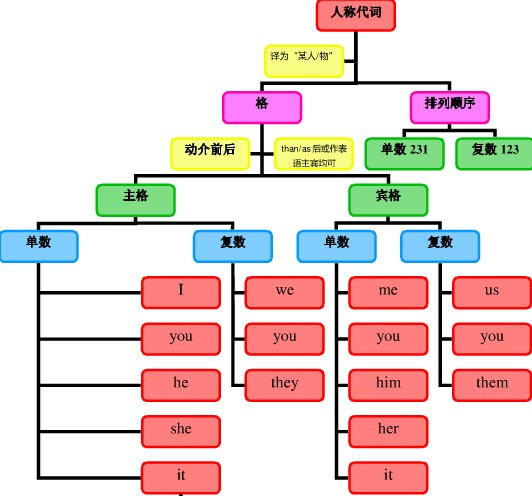
人称代词用法拓展:
1、在通常情况下,人称代词在句子中出现在它所代替的名词之后,即先出现名词,再出现相应的代词。但是,在书面语中,有时也可出现代词,后出现代词所代替的名词。
As soon as it had hopped off, the plane picked up speed.飞机刚一起飞,就加了速。
(比较:As soon as the plane had hopped off, it picked up speed.)
2、人称代词后跟名词同位语。有些人称代词后有时可跟同位语。
These small desks are forus students.这些小课桌是给我们学生的。
We girls often go to the movies together.我们女孩子常一起去看电影。
He asked you boys to be quiet.他要你们男孩子安静些。
连接代词的概念:
连接代词常用来引导一个主语从句、宾语从句和表语从句,在句中可用作主语、宾语、表语、定语等,连接代词主要包括who, whom, what, which, whose, whoever, whatever, whichever, whosever等。
whatever, whoever, whichever 用法说明:
主要用于引导主语从句和宾语从句。
如:He does whatever she asks him to do. 她要他做什么,他就做什么。
Whoever breaks the rules will be punished.谁违反这些规则都将受到处罚。
I'll give the ticket to whoever want sit. 请想要这票,我就把它给谁。
Whichever team gains the most points wins. 哪个队得分最多,哪个队就赢。
注:其中的ever主要用于加强语气,含有“一切”、“任何”、“无论”之义。使用这类词时,注意不要按汉语习惯用错句子结构:
如:任何人(谁)先来都可以得到一张票。
误:Anyone comes first can get a ticket./ Who comes first can get a ticket.
正:Anyone who comes first can get a ticket./ Whoever comes first can get a ticket.
连接代词的用法:
1、连接代词主要包括who, whom, what, which, whose, whoever, whatever, whichever, whosever等,它们在句中可用作主语、宾语、表语、定语等,可以引导主语从句、宾语从句和表语从句:
如:I don't know who he is. 我不知道他是谁。
What he says sounds reasonable. 他说的话听起来很有道理。
The question is who(m) we should trust. 问题是我们该信任谁。
I'll take whoever wants to go. 谁想去我就带谁去。
Take whichever seat you like? 你喜欢坐哪个座位就坐哪个?
I will just say whatever comes into my mind. 我想到什么就说什么。
注:who, whom, whoever等不用于名词前作定语。
2、what的两种用法。请看以下两个句子:
(1)I didn't know what he wanted. 我不知道他想要什么。
(2)I gave her what she wanted. 我给了她想要的一切。
上面第一句中的what表示“什么”,带有疑问的意味;第二句中的what表示“所…的一切事或东西”,其意义上大致相当于that(those) which, the thing(things) that, anything that, all that, as much as等,又如:
What[=That which] you say is quite true. 你说的完全是事实。
He saves what[=all that] he earns. 他赚多少,积蓄多少。
Call it what[=anything that] you please. 你喜欢叫它什么就叫它什么。
这样用的what有时还可后接一个名词:
如:He gave me what money[=all the money that] he had about him. 他把身边带有的钱全给了我。
What friends[=All the friends that] he has are out of the country. 他所有的朋友都在国外。
连接代词知识体系:

whatever, whoever, whichever 用法说明:
主要用于引导主语从句和宾语从句。
如:He does whatever she asks him to do. 她要他做什么,他就做什么。
Whoever breaks the rules will be punished.谁违反这些规则都将受到处罚。
I'll give the ticket to whoever want sit. 请想要这票,我就把它给谁。
Whichever team gains the most points wins. 哪个队得分最多,哪个队就赢。
注:其中的ever主要用于加强语气,含有“一切”、“任何”、“无论”之义。使用这类词时,注意不要按汉语习惯用错句子结构:
如:任何人(谁)先来都可以得到一张票。
误:Anyone comes first can get a ticket./ Who comes first can get a ticket.
正:Anyone who comes first can get a ticket./ Whoever comes first can get a ticket.
形容词的概念:
形容词(adjective),简称adj.或a,形容词用来修饰名词或代词,表示人或事物的性质、状态,和特征的程度好坏与否,形容词在句中作定语、表语、宾语补足语。通常,可将形容词分成性质形容词和叙述形容词两类,其位置不一定都放在名词前面。
形容词的作用与位置:
形容词是用来修饰名词的,常被放在名词前作定语,或放在系动词后面作表语。以下属几种特殊情况,须牢记;
(1)形容词短语作定语,定语后置。
如:a language difficult to master,
a leaning tower about 180 feet high
(2)表语形容词(afraid、alike、alone、asleep、awake、alive等)作定语,定语后置。如a man alive。有些表身体健康状况的形容词如well、faint、ill只作表语。sick既可作表语又可作定语,ill如作定语意为“bad”。
(3)用作定语,修饰由不定代词one、no、any、some和every构成的复合词如anything、something等时,通常后置。
如:I have something important to tell you.
(4)else常用作疑问代词和不定代词的后置定语。
(5)enough、nearby修饰名词前置或后置,程度副词一般位于形容词、副词前面,enough修饰形容词、副词时,必须后置。
(6)几个并列的形容词作定语,其语序通常为:限定语(The、A)+描绘性形容词+size(大小)+shape(形状)+age(年龄、时间)+color(颜色)+origin(国籍、来源)+material(材料)+purpose(目的)+名词。
口诀:
限定描绘大长高,形状年龄和新老;颜色国籍跟材料,作用类别往后靠。
如:a heavy black Chinese steel umbrella,
the man's first tow interesting little red French oil paintings
形容词的用法:
1、形容词修饰名词,说明事物或人的性质或特征。通常,可将形容词分成性质形容词和叙述形容词两类,其位置不一定都放在名词前面:
1)直接说明事物的性质或特征的形容词是性质形容词,它有级的变化,可以用程度副词修饰,在句中可作定语、表语和补语。例如:hot热的。
2)叙述形容词只能作表语,所以又称为表语形容词。这类形容词没有级的变化,也不可用程度副词修饰。
大多数以a开头的形容词都属于这一类。例如:
afraid害怕的。(错)Heisanillman. (对)Themanisill. (错)Sheisanafraidgirl. (对)Thegirlisafraid.
这类词还有:well,unwell,ill,faint,afraid,alike,alive,alone,asleep,awake等。
3)形容词作定语修饰名词时,要放在名词的前边。但是如果形容词修饰以-thing为字尾的词语时,要放在这些词之后。例如:somethingnice
2、用形容词表示类别和整体:
1)某些形容词加上定冠词可以泛指一类人,与谓语动词的复数连接。如:the dead,the living,the rich,the poor,the blind,the hungry The poorarelosinghope.穷人失去了希望。
2)有关国家和民族的形容词加上定冠词指这个民族的整体,与动词的复数连用。如:the British,the English,the French,the Chinese. The English have wonderful senseofhumor.
以-ly结尾的形容词:
1)大部分形容词加-ly可构成副词。但friendly,deadly,lovely,lonely,likely,lively,ugly,brotherly,仍为形容词。改错:
如:(错)She sang lovely.
(错)He spoke to me very friendly.
(对)Her singing was lovely.
(对)He spoke to me in a very friendly way.
2)有些以-ly结尾既为形容词,也为副词。 daily,weekly,monthly,yearly,early .
如:The Times is a daily paper.
The Times is published daily.
形容词知识体系:
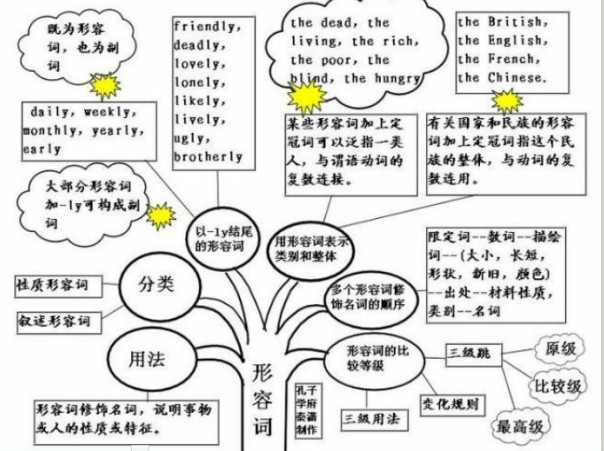
复合形容词的构成:
(1)形容词+名词+ed:
如:kind-hearted 好心的,white-haired 白发的
(2)形容词+形容词:
如:red-hot 炽热的,dark-blue 深蓝的
(3)形容词+现在分词:
如:good-looking 好看的,easy-going 随和的
(4)副词+现在分词:
如:hard-working 勤劳的,fast-moving 快速转动的
(5)副词+过去分词:
如:hard-won 得来不易的,newly-made 新建的
(6)名词+形容词:
如:life-long 终生的,world-famous 世界闻名的
(7)名词+现在分词:
如:peace-loving 爱好和平的,fun-loving 爱开玩笑的
(8)名词+过去分词:
如:snow-covered 白雪覆盖的,hand-made 手工的
(9)数词+名词+ed:
如:four-storeyed 4层楼的,three-legged 3条腿的
(10)数词+名词(名词用单数):
如:ten-year 10年的, two-man 两人的
关系副词的概念:
关系副词兼有副词与连接词两种作用,在不及物动词的连接中要求用关系副词。关系副词有when, where, why。
关系副词的特点:
关于副词用于引出定语从句,主要有when, where, why:
如:Sunday is the day when very few people go to work. 星期日是没什么人上班的日子。
That's the reason why he dislikes me. 这就是他不喜欢我的原因。
Do you know a shop where I can find sandals? 你知道哪家商店我能找到凉鞋吗?
注:关系副词用于引出定语从句,且在从句中用作状语。关系副词when表示时间,where表示地点,why表示原因。
使用关系副词应注意的几点:
(1)how不能用作关系副词,不要想当然地将how用作关系副词置于theway后表示方式:他说话就是那个样子。
误:This is the way how he spoke.
正:This is how he spoke./ This is the way(that, in which)he spoke.
(2)关系副词when和where既可引导限制性定语从句,也可引导非限制性定语从句,但why只能引导限制性定语从句,不能引导非限制性定语从句(若引导非限制性定语从句,可用for which reason)。
(3)引导定语从句时,when的先行词为时间,where的先行词为地点,why的先行词为原因(主要是the reason),但是反过来却不一定:
如:Don't forget the time(that) I've toldyou.不要忘记我告诉你的时间。
Do you know the house(that) he bought recently? 你知道他最近买的那座房子吗?
Please tell me there as on(that) you know. 请告诉我你所知道的原因吧。
关系副词的用法:
关系副词有when, where, why,作用有三个:
1、连接主句与从句;
2、代替先行词;
3、在从句中作状语,不可省略。
When和where既可引导限制性定语从句,也可引导非限制性定语从句。Why只能引导限制性定语从句。这些关系副词在意义上都相当于一定得“介词+which”结构。
1)when=at/in/on/during,在定语从句中作时间状语。
例如:Tell me the time when(at which) the train leaves.
注意:
①当表示时间的先行词在从句中中作主语或宾语时,不能用when。
例如:I will never forget the days I spent with your family.
②It/This/That+be+the first/second/last time that…句型中,that是习惯用法,不能用 when代替,that还可以省略。从句中使用与“be动词”呼应的完成形式。
例如:It is the first time that I have been to the Great Wall.
2)where表地点,只能跟在表示地点的名词后,它在定语从句中作地点状语。
例如:This is the second school where I used to teach.
注意:
①引导词where可用that替换,并经常可以省略。
例如:That's the place(where/that) we went before.
②当表示地点的先行词在句中作主语或宾语时,不用where,用关系代词that或which。
例如:The factory that/which we visited yesterday was built last year.
③where可与from连用。
例如:His head soon appeared out of the second story windows, from where he could see nothing but rees.
3)why表原因,引导的从句修饰名词reason。Why可用that或forwhich替换或省略。
例如:I don't know the reason(why/for which/that) he left here.
介词和介词短语的概念:
介词是一种用来表示词与词、词与句之间的关系的虚词,在句中不能单独作句子成分。介词后面一般有名词、代词或相当于名词的其他词类,短语或从句作它的宾语。介词和它的宾语构成介词词组,在句中作状语,表语,补语或介词宾语。介词可以分为时间介词、地点介词、方式介词和其他介词。
误用介词的三种情况:
1、多用介词:
多用介词可能是受汉语意思的影响将及物动词误用作不及物动词,也可能是受相关结构的影响而用错:
误:We discussed about the plan.
正:We discussed the plan. 我们讨论了计划。
误:Did he mention about the accident?
正:Did he mention the accident? 他提到那次事故了吗?
误:I saw her enter into the bank.
正:I saw her enter the bank. 我看见她进了银行。
误:He married with[to] a nurse.
正:He married a nurse. 他同一位护士结了婚。
误:How can contact with you?
正:How can contact you? 我怎么与你联系?
误:We should serve for the people heart and soul.
正:We should serve the people heart and soul. 我们应该全心全意地为人民服务。
误:Who controls over the factory? (但名词control可接over)
正:Who controls the factory? 谁管理这个工厂?
误:He has a great many of friends here. (比较a great number of)
正:He has a great many friends here. 他在这儿有很多朋友。
2、漏用介词:
漏用介词可能是受汉语意思的影响将不及物动词误用作及物动词,或是受相关结构的影响的影响而用错等:
误:This matter is difficult to deal. (deal with=处理)
正:This matter is difficult to deal with. 这事很难处理。
误:He is not a man to be depended.
正:He is not a man to be depended on. 他不是个可靠的人。
误:He took a cup of tea, and went on the story.
正:He took a cup of tea, and wentonwiththestory.他喝了一口茶,又接着讲故事。
误:My mother still regards me a child. (比较consider…as中的as可省略)
正:My mother still regards me as a child. 我母亲还把我当小孩看。
误:They insisted sending a car over to fetch us.
正:They insisted on sending a car over to fetch us.他们坚持要派车来接我们。
误:What he says is worth listening.
正:What he said is worth listening to.他的话值得一听。
3、错用介词:
错用介词的情况比较复杂,可能是因受汉语意思的而错,也可能是因弄不清搭配关系而错,可能是混淆用法而错,也可能是受相关结构的影响而错,可能是忽略语境而错,也可能是想当然的用错:
误:She called on his office yesterday. (call on+人,call at+地点)
正:She called at his office yesterday. 她昨天去了他办公室拜访。
误:He is engaged with a nurse.
正:He is engaged to a nurse.他与一位护士订了婚。
误:The sun rises from the east.
正:The sun rises in the east.太阳从东方升起。
误:Under his help, I finished it in time.
正:With his help, I finished it in time. 在他的帮助下,我及时做完了。
误:During he was in Japan, he visited many places.
正:During his stay in Japan, he visited many places.他在日本期间,参观过许多地方。
误:We are familiar to his character.
正:We are familiar with his character.我们了解他的性格。
误:Help yourself with the fruit.
正:Help yourself to the fruit.吃点水果吧。
介词的宾语:
1、名词或代词作介词宾语:
如:Are you interested in history? 你对历史感兴趣吗?
Don't worry about it. 别为它担心。
注:若是人称代词用作介词宾语,要注意用宾格。
如:No one can sing like her. 没有人能像她那样唱歌。(不能用like she)
2、动名词作介词宾语:
如:He is good at telling stories. 他善于讲故事。
In crossing the street he was run over. 他在穿过马路时被汽车撞倒。
3、过去分词作介词宾语:
如:We can't regard the matter as settled. 我们不能认为这事已经解决。
I take it for granted you have read the book. 我以为你读过这本书。
注:过去分词用作介词宾语通常只见于某些固定结构中,如上面第1句涉及regard…as(认为…是)结构,第2句涉及take sth for granted(认为某事属实)。在其他情况下,介词后通常不直接跟过去分词作宾语,若语义上需要接过去分词(表被动),可换用“being+过去分词”:
如:He went out without being seen by the others.他出去了,没有被其他人看见。
4、从句作介词宾语:
如:He was not satisfied with what she said. 他对她说的不满意。
I'm worried about where he is. 我担心他上哪儿去了。
注:介词后通常不接that从句,遇此情况需考虑用其他结构:
误:He paid no attention to that she was poor.
正:He paid no attention to the fact that she was poor. 他根本不注意她很穷这一事实。
但有个别介词(如except)可接that从句。
比较:I know nothing about him except that he lives next door./I know nothing about him except for the fact that he lives next door. 我只知道他住在隔壁,其它的就不知道了。
5、不定式作介词宾语:
如:I had no choice but to wait. 除了等,我没有别的选择。
He wanted nothing but to stay there. 他只想留在那儿。
They did nothing but complain. 他们老是一个劲地抱怨。
He never did anything but watch TV. 除了看电视,他从不干任何事。
注:(1)介词后接不定式的情形通常只见于but, except等极个别个词。该不定式有时带to,有时不带to,其区别是:若其前出现了动词do,其后的不定式通常不带to;
若其前没有出现动词do,则其后的不定式通常带to。
(2)介词后虽然通常不直接跟不定式作宾语,但却可接“连接代词(副词)+不定式”结构:
如:He gave me some advice on how to do it. 对于如何做这事他给我提了些建议。
6、形容词作介词宾语:
如:Her pronunciation is far from perfect. 她的语音远不是完美的。
In short, we must be prepared. 总而言之,我们要有准备。
Things have gone from bad to worse. 事情越来越糟。
注:(1)有些形容词用作介词宾语可视为其前省略了动名词being:
如:He regarded the situationas(being) serious. 他认为形势严重。
His work is far from(being) satisfactory. 他的工作丝毫不令人满意。
(2)有些“介词+形容词”的结构已构成固定搭配:in full全部地,全面地,无省略地; in private私下地,秘密地; in particular特别地;in general一般地,通常地,概括地; in brief 简言之;in short总之,简言之; in vain徒然地,徒劳无益地;for fee免费地,无偿地; for certain肯定地,确切地;for sure肯定地,确切地; for short为了简短,简称;atl arge自由自在地,逍遥法外; by far…得多
7、副词作介词宾语:
如:I can't stay for long. 我不能久呆。
It's too hot in here. 这里面太热了。
I looked every where except there. 除了那儿,我到处都看过了。
8、数词作介词宾语:
如:The city has a population of four million. 这座城市有四百万人口。
He was among the first to arrive. 他是第一批到的。
9、介词短语作介词宾语:
如:Choose a book from among these. 从这些书中选一本吧。
I saw her from across the street. 我从街的对面望见了她。
注:通常可后接介词短语作宾语的介词是from, till, until, since, except, instead of等。
比较:I took it from the bed. 我从床那儿(或床上)拿的。
I took it from under the bed. 我从床下拿的。
10、复合结构用作介词宾语:
如:She had no objection to Mary marrying him. 她不反对玛丽与他结婚。
She came in with a book in her hand. 她手里拿着一本书走了进来。
All the afternoon he worked with the door locked. 整个下午他都锁着门在房里工作。
介词短语的句法功能:
1、表语:
如:He was with a friend. 他和一个朋友在一起。
Health is above wealth. 健康胜过财富。
This knife is for cutting bread. 这把小刀是用于切面包的。
注:有些介词(如because of)引出的短语通常只用作状语,不用作表语:
误:His absence is because of the rain.
正:His absence is due to the rain. 他因雨未来。
但是,若主语是代词(不是名词),becauseof引出的短语可用作表语:
如:It is because of hard work. 那是因为辛苦工作的原因。
2、状语:
如:Don't touch it with your hands. 别用手去摸它。
Did you do this by design or by accident? 你这样做是有意的还是无意的?
3、定语:
如:This is his reply to your letter. 这是他给你的回信。
This is the best way of doing it. 这是做此事最好的方法。
My love for you is deeper than the sea. 我对你的爱比海深。
4、宾语补足语:
如:I found everythingin good condition. 我发现一切正常。
Her illness kept her in bed for a week. 她因生病在床上躺了一星期。
注:用作宾语补足语的介词短语在相应的被动语态中则为主语补足语:
如:He was regarded as a hero. 他被看成是英雄。
5、宾语:
如:A man stepped out from behind the wall. 一个人从墙后走出来。
He cannot spare anytime except on Sunday. 除星期日外,他抽不出时间。
6、主语:
如:Between6 and 7 suits me. 六点到七点对我比较适合。
After the exams is the time to relax. 考试后是轻松一下的时间。
注:介词短语通常不用作主语,尽管有时也像上面这样用作主语,但通常可视为是在一定的上下文中有所省略:
如:—When are we going to have the next meeting? 我们下次什么时候见面?
—On Tuesday may be convenient. 星期二可能比较方便。
此句中onTuesday虽用作主语,但可视为是其前省略了meeting一词:
即:Meeting during the vacation may be convenient.
动词短语的概念:
动词常和某些其他词类用在一起,构成固定词组,形成所谓短语动词(phrasalverb)。和动词一样,短语动词也可分为及物和不及物两种。短语动词可以作为一个整体看待,同一般动词一样使用。
动词短语的搭配类型:
1)动词+介词:这类短语动词用作及物动词,后面须跟宾语。
如:The small boy insisted on going with his parents. 那男孩坚持要跟父母一起去。
Do you often listen to broadcasts in English? 你常听英语广播吗?
Look at the children. Aren't they lovely? 看着这些孩子们。他们多么可爱呀!
We stand for self-reliance. 我们是主张自力更生的。
这一类的短语动词还有很多,如depend on(upon)(依靠),wait on(服侍),look for(寻找),deal with(对待),look after(照料),wait for(等待)等。
2)动词+副词:
这类短语动词有的用作及物动词,有的用作不及物动词。
如:I always get up as soon as the bell rings. 我总是一打铃就起床。(不及物)
Look out, there's a car coming! 当心,来汽车了!(不及物)
Have you handed in your exercises already? 你已经交练习了吗?(及物)
Please don't forget to put on your coat, it's cold outside. 请不要忘记穿外衣,外面很冷。(及物)
这一类的短语动词还有很多,及物如put out(扑灭),eat up(吃光),put down(放下);不及物如set off(出发),come up(走近),go on(继续)。
注:"动词+副词"这类短语动词和上面第一类"动词+介词"的不同之处在于:"动词+介词"用作及物动词,后面须跟宾语。"动词+副词"则有的及物,有的不及物;用作及物动词而宾语为人称代词或自身代词时,副词往往放在宾语之后。
如:Please wake me up at five tomorrow. 请在明天早上五点唤醒我。
If you have done your exercises, please hand them in. 如果你们练习做完了请交来。
She doesn't normally behave like that, she's putting it on. 她通常并不如此表现,她是装出来的。
注:这类短语动词有不少可兼作及物和不及物动词用。
如:He took off his hat when he entered the office. 他进办公室后脱下帽子。(及物)
The plane took off at seven sharp. 飞机在七点整起飞。(不及物)
Charlie rang up Neil to ask about the time of the meeting. 查理打电话给尼尔问开会的时间。(及物)
If you can't come, please ring up and let us know. 你如来不了,请来电话告诉我们一声。(不及物)
3)动词+副词+介词:
"动词+副词"之后有的可以再加一个介词,形成另一种短语动词。这类短语动词用作及物动词。
如:Do not give up hope. We must go on with the experiment 不要失望。我们必须继续试验。(go on with继续)
He came up to me. 他走到我跟前。(come up to走近)
这类短语动词还有:look down upon(看不起),do away with(去掉),put up with(忍受)等。
4)动词+名词+介词:
这类短语动词也是及物的。
如:He shook hands with all the guests at the banquet. 他在宴会上和宾客一一握手。
Young pioneers often come to the Children's Palace to take part in after school activities.少先队员经常到少年宫来参加课外活动。
Pay attention to the temperature of the stored rice. 注意仓库里的稻谷的温度。
Her job is taking care of the babies. 她的工作是照顾婴儿。
这一类短语动词还有:put an end to(结束),take notice of(注意),catch hold of(抓住),lose sight of(看不见),make use of(利用)等。
动词短语知识体系:
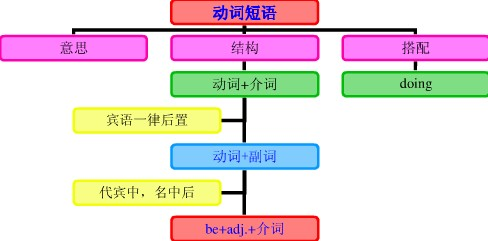
一般现在时的被动语态的概念:
表示的是一般现在时态和被动语态的叠合。构成:(am/is/are +done)
如:This shirt is washed once a week. 这件T恤一周洗一次。
主动语态变被动语态的方法:
1、把主动语态的宾语变为被动语态的主语。
2、把谓语变成被动结构(be+过去分词),根据被动语态句子里的主语的人称和数,以及原来主动语态句子中动词的时态来决定be的形式。
3、把主动语态中的主语放在介词by之后作宾语,将主格改为宾格。
例如:All the people laughed at him.=He was laughed at by all people.
They make the bikes in the factory.=The bikes are made by them in the factory.
记忆歌诀:
宾变主,主变宾,by短语后面跟。
谓语动词变被动,be后“过分”来使用。
含有情态动词的被动语态:
含有情态动词的主动句变成被动句时,由“情态动词+be+过去分词”构成,原来带to的情态动词变成被动语态后“to”仍要保留。
记忆歌诀:
情态动词变动,情态加be加“过分”,原来带to要保留。
例如:We can repair this watch in two days.=This watch can be repaired in two days.
You ought to take it away.=It ought to be taken away.
They should do it at once.=It should be done at once.
被动语态的用法:
1、不知道或没有必要说明动作的执行者是谁。
例如:Some new computers were stolen last night.一些新电脑在昨晚被盗了。(不知道电脑是谁偷的)
This book was published in1981.这 本书出版于1981年。
2、强调动作的承受者,而不强调动作的执行者。
例如:This book was written by him. 这本书是他写的。
Eight hours per day for sleep must be guaranteed. 每天8小时睡眠必须得到保证。
记忆歌诀:
谁做的动作不知道,说出谁做的没有必要;动作承受者需强调,被动语态运用到。
一般现在时的被动语态:
一、被动语态的结构:
主语(动作接受者)+is/am/are+动词的过去分词+(by+动作执行者)
如:Football is played in most countries in the world.
被动语态的句型总结如下:
1、肯定句:主语+be+过去分词+(by~~).
如:The boy is called Jack.
2、否定句:主语+be not+过去分词+(by~~).
如:The baby is not looked after by his father.
3、一般疑问句:Be+主语+过去分词+(by~~)?
如:Is KingLear written by Shakespeare?
4、特殊疑问句:特殊疑词+be+过去分词+(by~~)?
如:What is this kind of sweater made of?
二、被动语态的用法:
1、要表达“被…”、“受…”、“让…”、“遭…”之类的语义。
如:The teachers are well respected.
The child is well loved by people.
2、强调动作承受者。
如:He is known far and wide. 他远近闻名。
3、不知道式没有必要指出动作的执行者。
如: The room is cleaned every day. 房子每天都有人打扫。
4、为礼貌起见避免提及动作执行者。
如:I wonder if I was allowed to introduce myself? 我是否可以做自我介绍?
主谓一致的概念:
谓语的数必须和主语的人称和数保持一致,这就叫主谓一致。
主谓一致的基本原则:
1)语法一致原则,即在语法形式上取得一致。例如,主语是单数形式,谓语动词也采取单数形式;主语是复数形式,谓语动词也采取复数形式。
例如:The students are very young.
This picture looks beautiful.
2)意义一致原则,即从意义着眼处理一致关系。例如,主语形式虽是单数但意义是复数,谓语动词也采取复数形式;
而有些主语形式虽是复数但意义上看作单数,谓语动词也采取单数形式。
例如:The people in that country are fighting for independence.
The crowd deeply respect their leader.
Three years in a strange land seems a long time.
3)就近原则,即谓语动词的单数或复数形式取决于最靠近它的词语。
例如:Neither hen or I am going to see the film tonight because we are busy.
几对容易混淆词组的一致用法:
1、由“this/thatkind/typeof+名词”作主语,谓语动词用单数形式;而由"these/thosekind/typeof+复数名词”作主语,谓语动词用复数形式。
例如:This kind of apples is highly priced.
Those kind(s) of tests are good.
2、由“a number of,a totalo f,an average of+复数名词”作主语,谓语动词用复数形式;由“the number of,the total of,the average of+复数名词”作主语,谓语动词用单数形式。
例如:A number of students are waiting for the bus.
The number of the students in this university is increasing yearly.
3、one of,the(only) one of的一致用法
例如:This is one of the books that have been recommended.
This is the(only) one of the books that has been recommended.
主谓一致用法点拨:
1、并列结构作主语谓语用复数:
如:Reading and writing are very important.
注意:当主语由and连结时,如果它表示一个单一的概念,即指同一人或同一物时,谓语动词用单数,and此时连接的两个词前只有一个冠词。
如:The iron and steel industry is very important to our life.
典型例题:
The League secretary and monitor___asked to make a speech at the meeting.
A. is
B. was
C. are
D. were
答案:B.
注:先从时态上考虑。这是过去发生的事情应用过去时,先排除A、C本题易误选D,因为The League secretary and monitor 好象是两个人,但仔细辨别,monitor前没有the,在英语中,当一人兼数职时只在第一个职务前加定冠词。后面的职务用and相连。这样本题主语为一个人,所以应选B。
2、主谓一致中的靠近原则:
1)当there be句型的主语是一系列事物时,谓语应与最邻近的主语保持一致。
例如:There is a pen, a knife and several books on the desk.
There are twenty boy-students and twenty-three girl-students in the class.
2)当either…or…与neither…nor,连接两个主语时,谓语动词与最邻近的主语保持一致。
如果句子是由here, there引导,而主语又不止一个时,谓语通常也和最邻近的主语一致。
例如:Either you or she is to go.
Here is a pen, a few envelops and some paper for you.
3、谓语动词与前面的主语一致:
当主语后面跟有with, together with, like, except, but, no less than, as well as等词引起的短语时,谓语动词与前面的主语一致。
例如:The teacher together with some students is visiting the factory.
He as well as I wants to go boating.
4、谓语需用单数:
1)代词each和由every, some, no, any等构成的复合代词作主语,或主语中含有each,every,谓语需用单数。
例如:Each of us has a tape-recorder.
2)当主语是一本书或一条格言时,谓语动词常用单数。
例如:The Arabian Night is a book known to lovers of English.
3)表示金钱,时间,价格或度量衡的复合名词作主语时,通常把这些名词看作一个整体,谓语一般用单数。(用复数也可,意思不变。)
例如:Three weeks was allowed for making the necessary preparations.
Ten yuan is enough.
5、指代意义决定谓语的单复数:
1)在代词what, which, who, none, some, any, more, most, all等词的单复数由其指代的词的单复数决定。
例如:All is right. (一切顺利。)
All are present. (所有人都到齐了。)
2)集体名词作主语时,谓语的数要根据主语的意思来决定。
例如:family, audience, crew, crowd, class, company, committee等词后用复数形式时,意为这个集体中的各个成员,用单数时表示该个集体。
例如:His family isn't very large. 他家不是一个大家庭。
His family are music lovers. 他的家人都是音乐爱好者。
但集合名词people, police, cattle, poultry等在任何情况下都用复数形式。
例如:Are there any police around?
3)有些名词,如variety, number, population, proportion, majority等有时看作单数,有时看作复数。
A number of+名词复数+复数动词。 The number of+名词复数+单数动词。
例如:A number of books have lent out.
The majority of the students like English.
6、与后接名词或代词保持一致:
1)用half of, part of, most of, a portion of等词引起主语时,动词通常与of后面的名词,代词保持一致。
例如:Most of his money is spent on books.
Most of the students are taking an active part in sports.
2)在一些短语,如many a或more than one所修饰的词作主语时,谓语动词多用单数形式。
但由more than…of作主语时,动词应与其后的名词或代词保持一致。
例如:Many a person has read the novel. 许多人都读过这本书。
More than 60percent of the students are from the city. 百分之六十多的学生都来自这个城市
主谓一致知识体系:
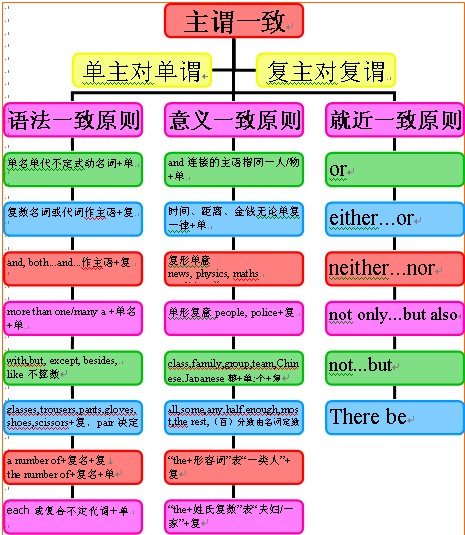
主谓一致用法拓展:
1)当everyone,everybody,noone,nobody,anyone,anybody,someone,somebody,everything,anything,something,nothing等用作主语时,其相应的代词一般用单数形式。
例如:If anybody calls, tell him that I'm out.
Something strange happened, didn't it?
2)人称代词与名词的呼应:人称代词I(me),he(him),she(her),it(it) 都是代替前面的单数名词,而they(them),we(us)则是代替复数名词的,you既可以代表单数,也可以代表复数。但表示泛指的时候,用he或one来表示。
例如:If a young person enters a classical music field only for money, he is in the wrong profession.
3)物主代词与名词的呼应:my,our,his,her,its,their要与代替的名词在数上一致。
例如:The welfare department,as well as the other social services,will have its budget cut.
4)反身代词与其所代成分间的呼应。
例如:Many primitive people believed that by eating ananimal they could get some of the good qualities of that animal for themselves.
5)指示代词与所代名词间的呼应:this和that指代单数名词或不可数名词,these和those指代复数名词(those还可以用作先行词,引导定语从句,表示“那些人”)。
例如:She invited all those who had been her former colleagues.
6)much和muchof后接不可数名词,而many和manyof后接可数名词的复数。
例如:There is not much coal left.
A great many of the houses were knocked down by the earthquake.
7)表示量的词后面有的接可数名词,有的接不可数名词。
接可数名词的有:a number of,a rangeof,a series of十复数名词;
接不可数名词的有:a great deal of,an amount of十不可数名词;
既可接可数又可接不可数名词的有:a lot of,a variety of。
例如:1.The government attached a great deal of importance to education.
2.Quiteanumberofwomenappliedforthisjob.
3.The college library has avariety of books.
4.An apple is avariety off ruit.
与“短文改错。文中共有10处语言错误,要求你在错误的地方增加、...”考查相似的试题有:
- As is known to all, one of the many benefits of ________ adventure travel is teaching children how to cope with _____...
- 短文改错Construction of a television tower that declared to be the world's tallestis due to starting in the capital o...
- 短文改错。此题要求改正所给短文中的错误。对标有题号的每一行作出判断:如无错误,在该行右边横线上画一个勾(√);如有错误(...
- What is the ______ news?A.lateB.laterC.latestD.latter
- _______, the boy entered a secret cave.[ ]A. Worry and curiouslyB. Worried and curiousC. Worriedly and curiouslyD. Wo...
- Tom took the police to the spot ________ the accident happened.[ ]A. whichB. thatC. whereD. when
- 短文改错。假定英语课上老师要求同桌之间交换修改作文,请你修改你同桌写的以下作文。文中共有10处语言错误,每句中最多有两处...
- The two balls fell ________the same speed and landed ________the ground at the same time.A.off;onB.by;inC.with;on...
- --- I forgot to do my homework. Don’t tell the teacher.--- I won’t tell anybody, but do you think you can _______ it?...
- Over 80 percent of the population of China ____ peasants.A.wasB.isC.would beD.are